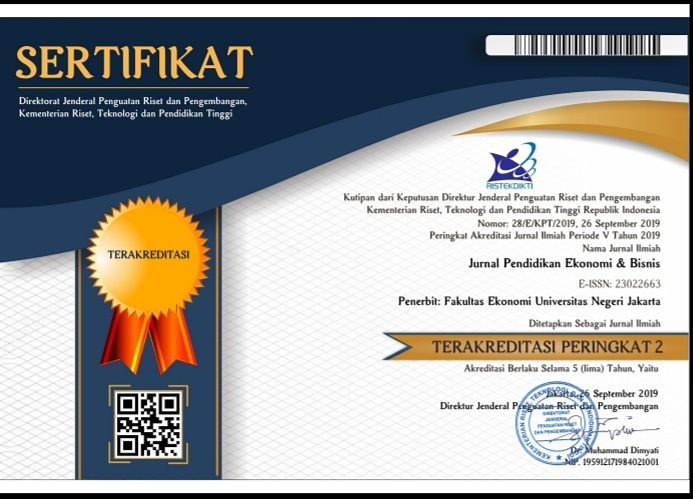TINGKAT PENDIDIKAN TENAGA KERJA, PENGELUARAN PEMERINTAH SEKTOR PENDIDIKAN, DAN PERTUMBUHAN EKONOMI DI INDONESIA TAHUN 2008-2012
DOI:
https://doi.org/10.21009/JPEB.003.1.3Keywords:
economic growth, education, employment and Government spending on Education Sector.Abstract
This research was conducted by observing the level of education graduate workforce, government spending and education sector gross regional domestic product per capita on the basis of constant prices of 2000. In particular the period of 2008-2012 by ex post facto method. The form of panel research data i.e. the combination of the form of time series and cross section. Data on GDP per capita over the constant prices of 2000 and the education level of the labour ditamatkan taken from the Central Bureau of statistics (BPS). Data on government spending on the education sector budget data taken from the income and expenditure of the State (APBN) Indonesia to education sector of the Ministry of Finance of the Republic of Indonesia. Processing data using Eviews 7.0 program and Microsoft Excell. Based on the results of the regression, the influential education variable is positive and significant at levels significantly below 0.05 and variable expenses of government education sector a positive and significant effect on under 0.05 i.e. against economic growth. The value Fhitung (7.360407) Ftabel > (3.90) so summed up these two variables, namely educational level of manpower and Government spending education sector together effect on Indonesia's economic growth. The value of R2 0.568211 signaling that 56,82% economic growth in Indonesia could be explained both the variable indipenden.
Keywords: economic growth, education, employment and Government spending on Education Sector.
Downloads
Published
How to Cite
Issue
Section
License
Articles in Jurnal Pendidikan Ekonomi & Bisnis are Open Access articles published under the Creative Commons CC BY-NC-SA License This license permits use, distribution and reproduction in any medium for non-commercial purposes only, provided the original work and source is properly cited. Any derivative of the original must be distributed under the same license as the original.







